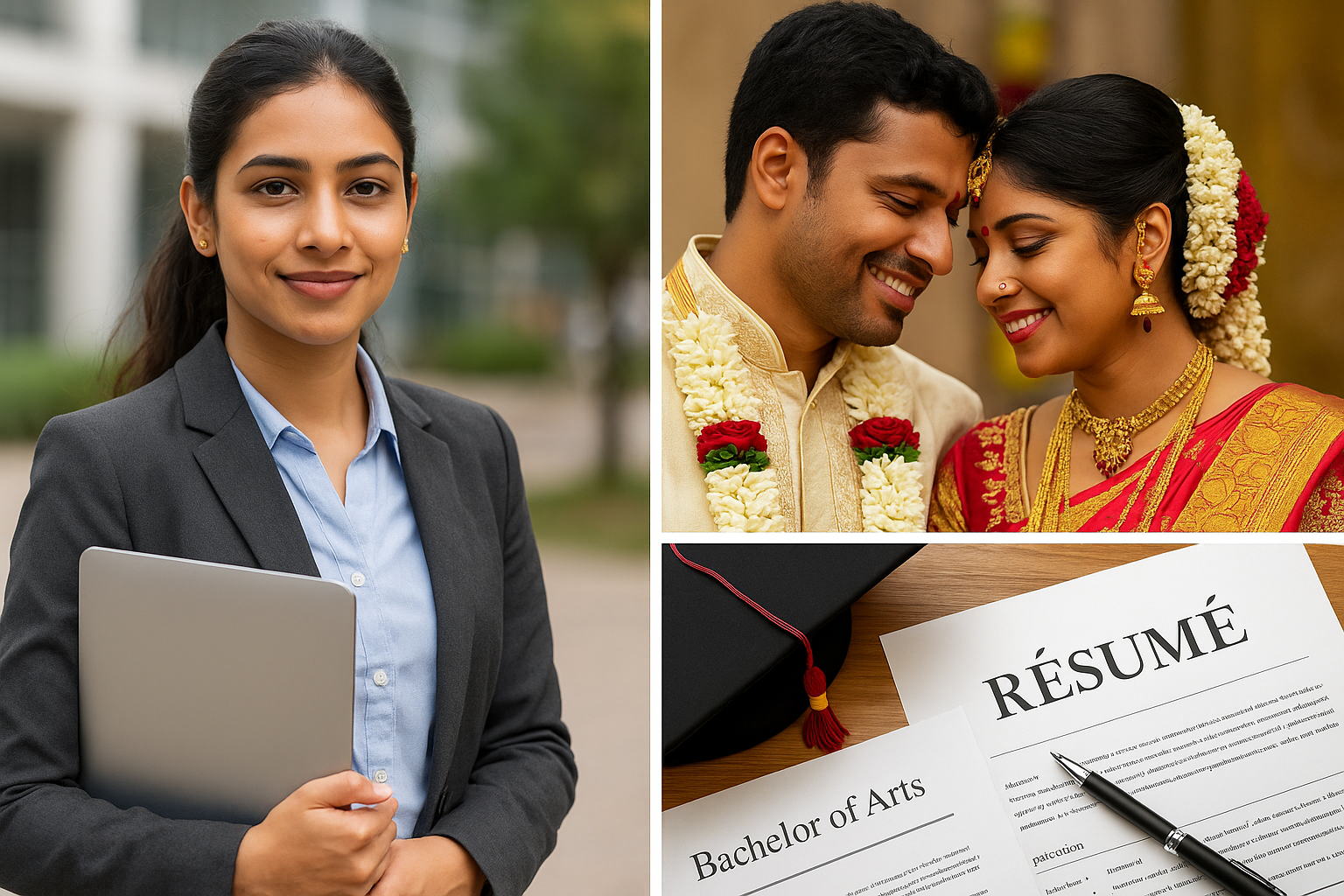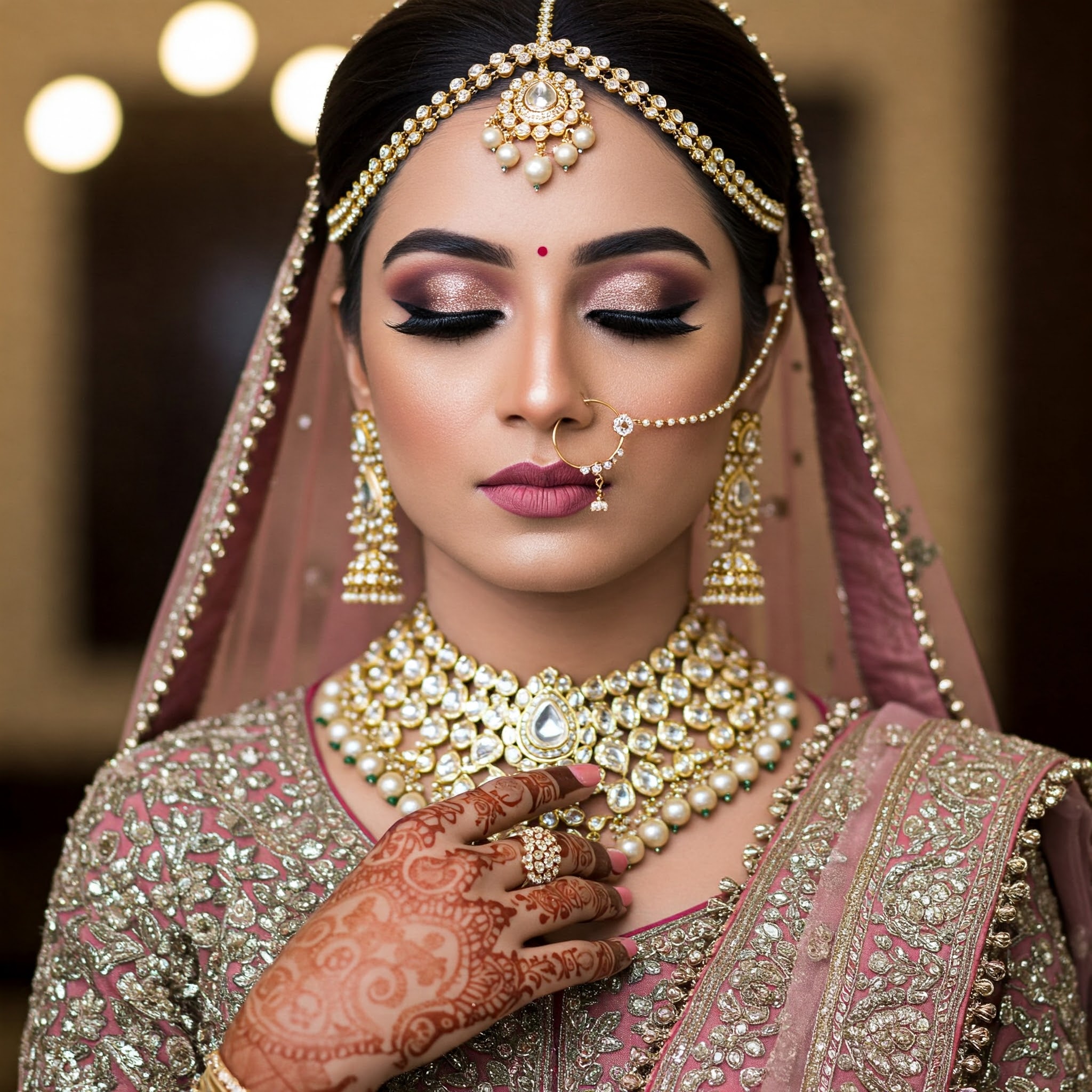
How Education and Career Influence Tamil Marriage Preferences
27-May-2025 DigiShaadi
Introduction
In Tamil culture, marriage is far more than the bond of two souls—it represents an alliance of families, socio-economic aspirations, and community prestige. Over recent decades, education and career have become pivotal in matchmaking decisions. A degree from a top institution and a stable, upward-moving profession convey discipline, future security, and a modern outlook—qualities that families now weigh alongside traditional criteria like caste and horoscope compatibility.
The historical role of education in Tamil matrimony
-
How academic credentials intersect with caste and subcaste expectations
-
Contrasting urban and rural mindsets on education and careers
-
Emerging trends among the Tamil diaspora
-
Ways to optimize profiles on DigiShaadi’s Tamil Matrimony Online
-
Links to key cluster posts on finding partners, rituals, and caste dynamics
Whether you’re preparing your biodata, guiding parents, or simply curious, you’ll gain actionable insights into why Tamil matchmakers now ask for CVs alongside biodata sheets—and how to navigate this evolving terrain successfully.
Historical Context: From Scholarly Lineages to Degree-Driven Matches
Traditionally, Tamil Brahmin families prized Vedic scholarship, classical arts, and temple learning. Outside Brahmin circles, literacy and government service were marks of respect: families with teachers, journalists, or civil servants commanded social capital. However, advanced formal degrees were limited to those entering colonial administration or missionary-run colleges.
By the 1960s and ’70s, government engineering and arts colleges proliferated, broadening access to higher education. The 21st century then saw the rise of premier institutions—like the Indian Institutes of Technology (IITs) and top medical colleges—alongside international programmes. Today, a postgraduate degree or professional certification isn’t just academic—it’s viewed as a sign of discipline, ambition, and economic security, making it integral to matrimonial evaluations.
Academic Qualifications as Social Capital
Why do Tamil parents request postgraduate degrees or professional diplomas on matrimonial biodata? Because education now functions as social capital in three key ways:
Indicator of Upward Mobility: A candidate with an MBA, engineering degree, or medical qualification suggests financial stability and a comfortable future.
-
Measure of Discipline and Ambition: Completing rigorous academic programmes signals tenacity—an encouraging trait for lifelong partnership.
-
Enhancer of Community Prestige: Degrees from elite institutes (e.g., IIT, Anna University, London School of Economics) elevate not just the individual but the entire family’s standing within local and diaspora circles.
However, this emphasis on credentials has also led to degree inflation, where even entry-level corporate roles often expect a master’s degree, inadvertently raising the bar for matrimonial eligibility.
The Caste–Education Nexus
Although modern matchmakers highlight education, caste and subcaste remain influential. Scholastic achievement can both reinforce and transcend caste boundaries:
Reinforcement: An Iyer or Mudaliar graduate from a top-tier institution often commands more matrimonial leverage, with families seeing their subcaste status validated by prestigious credentials.
-
Transcendence: Conversely, particularly when degrees are earned abroad, some families prioritise academic prestige over fine-grained subcaste distinctions, opting to match across subcaste lines to secure global exposure and career prospects.
For an in-depth look at how caste and subcaste preferences evolve alongside technology, check out our cluster article on Caste and Subcaste Preferences in Tamil Matrimony.
Urban and Rural Perspectives on Education and Career
Urban Tamil families typically expect at least a bachelor’s degree, often from reputable colleges, and place high value on corporate, startup, or overseas careers. They tend to marry later—usually in the late twenties or early thirties—so that both partners can establish themselves professionally. Digital fluency is a given: profiles on platforms like Tamil Matrimony Online are meticulously crafted, highlighting LinkedIn links, certifications, and employer details.
In contrast, rural families may be satisfied with a high-school diploma or local diploma (polytechnic) qualifications. Government jobs—such as teaching in village schools or clerical positions in local administrations—remain highly respected. Rural weddings often occur earlier, in the early to mid-twenties, prioritising family formation over prolonged career building. Matchmaking still heavily involves local brokers and word-of-mouth networks, though online sites are gradually gaining traction in more connected villages.
Despite these differences, the digital shift is undeniable: even in rural settings, savvy parents and candidates are beginning to recognise that clear listings of education and career details online can expedite matches and broaden the search beyond local circles. For more on urban vs. rural mindsets, see How Urban vs. Rural Tamils Approach Matrimony Differently.
Gendered Impacts of Education and Career
Education and career milestones influence men’s and women’s marriage prospects in nuanced ways:
For Grooms: Advanced degrees and stable jobs—especially in government or corporate sectors—are seen as reducing dowry expectations and signalling long-term financial security.
-
For Brides: A postgraduate degree enhances her value as an intellectual companion and potential co-earner. Dual-income households are celebrated in urban families, though some traditional rural families may still prefer brides who focus on household roles.
Urban Tamil families increasingly seek equals in education and income, fostering partnerships where both spouses contribute professionally and domestically. However, in more traditional or rural contexts, the bride’s education may be respected more for personal growth and family prestige than as a means of shared income.
The Diaspora Effect: NRI Credentials & Cross-Continental Matches
Among Tamil NRIs, foreign degrees and international careers often eclipse domestic qualifications:
Graduates from US, UK, or European universities command significant matrimonial appeal, sometimes even over higher-caste, domestically trained candidates.
-
Gulf-based engineers and doctors in the UAE or Saudi Arabia remain in high demand, their expatriate incomes seen as lucrative.
-
A newer trend is the rise of digital-nomad profiles, highlighting remote work and cross-cultural adaptability.
Diaspora families often transcend subcaste rigidity, focusing instead on academic pedigree and global exposure. For NRI candidates looking to craft an effective profile, refer to our cluster post: How to Find Your Perfect Tamil Life Partner.
Blending Education with Wedding Rituals
Education and professional milestones are now woven into modern Tamil wedding customs:
Pre-Wedding Degree Celebrations: Some families host small ceremonies to honor a child’s graduation before the main engagement rituals—treating it as a rite of passage.
-
Digital Invitations: QR-coded invites link guests to the bride or groom’s LinkedIn profiles, portfolios, or personal websites.
-
Customised Poojas: A software engineer groom might include a “code-blessing” ritual, while a doctor bride may have a “healing pooja” honouring her vocation.
These innovations underscore how modern Tamil weddings celebrate both tradition and individual achievement. To explore more rituals, see Top Tamil Wedding Rituals You Must Know Before Marriage.
Optimizing Your Profile on DigiShaadi’s “Tamil Matrimony Online”
DigiShaadi’s Tamil Matrimony Online—the pillar platform—offers powerful tools to highlight your education and career:
Dedicated Academic Fields: Clearly list degrees, institutions, grades, and year of graduation.
-
Professional Highlights: Add detailed job titles, employer names, tenure, and brief role descriptions.
-
Advanced Filters: Search for specific qualifications (e.g., MBA, MD) or industries (IT, finance, healthcare).
-
AI-Driven Matches: Get recommendations based on shared academic and professional attributes.
Pro Tip: Craft a concise headline—such as “Anna University B.E. & IIM-A Alumna Seeking Equally Driven Partner”—to immediately convey your educational strength and match preferences.
Practical Tips for Candidates and Parents
Full Transparency: Don’t understate any degree or certification—omitting qualifications dilutes your profile’s impact.
Balance Credentials with Personality: Use your bio and photos to showcase hobbies, values, and personal stories beyond academia.
Anticipate Parental Priorities: Some families may still place caste above career—be ready to discuss both aspects.
Keep Profiles Updated: New promotions, certifications, or skill courses should be added promptly to stay competitive.
Initiate Pre-Proposal Dialogues: Discuss long-term career aspirations, work-life balance, and family expectations early to ensure alignment.
Conclusion
Education and career trajectories have become central pillars of Tamil matchmaking—on par with, and sometimes even surpassing, traditional criteria. From urban tech hubs to rural countryside and from Chennai graduates to Gulf-based engineers, academic and professional achievements shape compatibility, social standing, and wedding customs. As families and candidates negotiate these new parameters, platforms like Tamil Matrimony Online provide the digital architecture to marry time-honored traditions with contemporary expectations.
Ready to leverage your degrees and career milestones for the perfect match? Explore Tamil Matrimony Online now, and dive into your personalised matchmaking journey.




